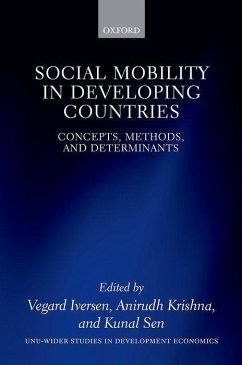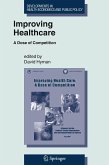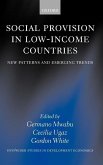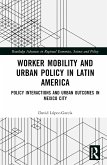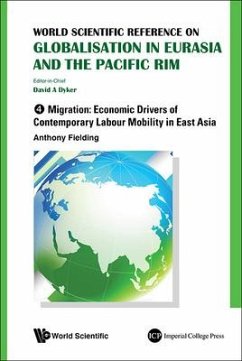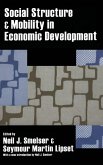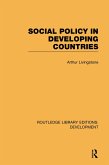Social Mobility in Developing Countries
Concepts, Methods, and Determinants
Herausgeber: Iversen, Vegard; Sen, Kunal; Krishna, Anirudh
Social Mobility in Developing Countries
Concepts, Methods, and Determinants
Herausgeber: Iversen, Vegard; Sen, Kunal; Krishna, Anirudh
- Gebundenes Buch
- Merkliste
- Auf die Merkliste
- Bewerten Bewerten
- Teilen
- Produkt teilen
- Produkterinnerung
- Produkterinnerung
Combines research from different disciplines to assess social mobility in developing countries.
Andere Kunden interessierten sich auch für
![Comparative Public Budgeting: A Global Perspective Comparative Public Budgeting: A Global Perspective]() Charles E MenifieldComparative Public Budgeting: A Global Perspective164,99 €
Charles E MenifieldComparative Public Budgeting: A Global Perspective164,99 €![Improving Healthcare Improving Healthcare]() D. HymanImproving Healthcare174,99 €
D. HymanImproving Healthcare174,99 €![Social Provision in Low-Income Countries Social Provision in Low-Income Countries]() Germano Mwabu / Cecilia Ugaz / Gordon White (eds.)Social Provision in Low-Income Countries250,99 €
Germano Mwabu / Cecilia Ugaz / Gordon White (eds.)Social Provision in Low-Income Countries250,99 €![Worker Mobility and Urban Policy in Latin America Worker Mobility and Urban Policy in Latin America]() David López-GarcíaWorker Mobility and Urban Policy in Latin America165,99 €
David López-GarcíaWorker Mobility and Urban Policy in Latin America165,99 €![World Scientific Reference on Globalisation in Eurasia and the Pacific Rim - Volume 4: Migration: Economic Drivers of Contemporary Labour Mobility in East Asia World Scientific Reference on Globalisation in Eurasia and the Pacific Rim - Volume 4: Migration: Economic Drivers of Contemporary Labour Mobility in East Asia]() Anthony FieldingWorld Scientific Reference on Globalisation in Eurasia and the Pacific Rim - Volume 4: Migration: Economic Drivers of Contemporary Labour Mobility in East Asia208,99 €
Anthony FieldingWorld Scientific Reference on Globalisation in Eurasia and the Pacific Rim - Volume 4: Migration: Economic Drivers of Contemporary Labour Mobility in East Asia208,99 €![Social Structure and Mobility in Economic Development Social Structure and Mobility in Economic Development]() Social Structure and Mobility in Economic Development180,99 €
Social Structure and Mobility in Economic Development180,99 €![Social Policy in Developing Countries Social Policy in Developing Countries]() Arthur LivingstoneSocial Policy in Developing Countries180,99 €
Arthur LivingstoneSocial Policy in Developing Countries180,99 €-
-
-
Combines research from different disciplines to assess social mobility in developing countries.
Hinweis: Dieser Artikel kann nur an eine deutsche Lieferadresse ausgeliefert werden.
Hinweis: Dieser Artikel kann nur an eine deutsche Lieferadresse ausgeliefert werden.
Produktdetails
- Produktdetails
- Verlag: Hurst & Co.
- Seitenzahl: 512
- Erscheinungstermin: 21. März 2022
- Englisch
- Abmessung: 229mm x 157mm x 36mm
- Gewicht: 930g
- ISBN-13: 9780192896858
- ISBN-10: 0192896857
- Artikelnr.: 61937367
- Herstellerkennzeichnung
- Libri GmbH
- Europaallee 1
- 36244 Bad Hersfeld
- gpsr@libri.de
- Verlag: Hurst & Co.
- Seitenzahl: 512
- Erscheinungstermin: 21. März 2022
- Englisch
- Abmessung: 229mm x 157mm x 36mm
- Gewicht: 930g
- ISBN-13: 9780192896858
- ISBN-10: 0192896857
- Artikelnr.: 61937367
- Herstellerkennzeichnung
- Libri GmbH
- Europaallee 1
- 36244 Bad Hersfeld
- gpsr@libri.de
Vegard Iversen is Professor of Development Economics and Head of the Livelihoods and Institutions Department, Natural Resources Institute (NRI), University of Greenwich. After completing his PhD in development economics from University of Cambridge in 2000, he was tenured faculty at School of Development Studies, University of East Anglia until he moved to India in 2006. While living and working in India he was a Research Fellow in IFPRI's New Delhi office, a visiting faculty member at Indian Statistical Institute (Delhi), a Professor and Vice Dean at Jindal School of Government and Public Policy, an Adjunct Professor at Sanford School of Public Policy's Duke Semester in India programme and a Professor in the Economics Area, Indian Institute of Management Ahmedabad. He received the Annual Dudley Seers Memorial Prize for the best article in Journal of Development Studies in 2008 and has served on the journal's editorial board since 2016. Anirudh Krishna is the Edgar T. Thompson Professor of Public Policy and Political Science at Duke University. He received his PhD in government from Cornell University in 2000, and a Master's in economics from Delhi University in 1980. Professor Krishna's research investigates how poor communities and individuals in developing countries cope with the structural and personal constraints that result in poverty and powerlessness. Before returning to academia in 2000, he spent 14 years with the Indian Administrative Service, managing diverse rural and urban development initiatives. He received an honorary doctorate from Uppsala University in 2011; the Olaf Palme Visiting Professorship from the Swedish Research Council in 2007; the Dudley Seers Memorial Prize in 2005 and 2013; and a best article award of the American Political Science Association in 2002. Kunal Sen has over three decades of experience in academic and applied development economics research. He is the author of eight books and the editor of five volumes on the economics and political economy of development. He is Director of UNU-WIDER in Helsinki, and is a Professor of development economics at the Global Development Institute, University of Manchester. Professor Sen is a leading international expert on the political economy of growth and development. He has performed extensive research on international finance, the political economy determinants of inclusive growth, the dynamics of poverty, social exclusion, female labour force participation, and the informal sector in developing economies. His research has focused on India, East Asia, and sub-Saharan Africa. He was awarded the Sanjaya Lall Prize in 2006 and the Dudley Seers Prize in 2003 for his publications.
* PART I. INTRODUCTION
* 1: Vegard Iversen, Anirudh Krishna, and Kunal Sen: The state of
knowledge about social mobility in the developing world
* PART II: THEORY AND CONCEPTS
* 2: Patrizio Piraino: Drivers of mobility in the Global South
* 3: Gary Fields: Exploring concepts of social mobility
* 4: Vegard Iversen: Social mobility in developing countries:
Measurement and downward mobility pitfalls
* 5: Ravi Kanbur: In praise of snapshots
* PART III: TYPES OF MOBILITY
* 6: Himanshu and Peter Lanjouw: Income mobility in the developing
world: Recent approaches and evidence
* 7: Florencia Torche: Educational mobility in the developing world
* 8: Anthony Heath and Yizhang Zhao: Rethinking occupational mobility
in developing countries: Conceptual issues and empirical findings
* PART IV: DIALOGUE ON MEASUREMENT AND METHODS
* 9: M. Shahe Emran and Forhad Shilpi: Economic approach to
intergenerational mobility: Measures, methods, and challenges in
developing countries
* 10: Yaojun Li: Social mobility in China: A case study of social
mobility research in the Global South
* 11: Divya Vaid: Ethnography and social mobility: A review
* 12: Gregory Clark: Measuring social mobility in historic and less
developed societies
* PART V: DRIVERS AND INHIBITORS
* 13: Jere Behrman: Social mobility and human capital in low- and
middle-income countries
* 14: Anirudh Krishna and Emily Rains: Informalities, volatility, and
precarious social mobility in urban slums
* 15: Nancy Luke: Gender and social mobility: Exploring gender
attitudes and women's labour force participation
* 16: Patricia Funjika and Rachel M. Gisselquist: Social mobility and
horizontal inequality
* 17: Anandi Mani and Emma Riley: Social networks as levers of mobility
* PART VI: CONCLUSIONS
* 18: Vegard Iversen, Anirudh Krishna, and Kunal Sen: Social mobility
in developing countries: Directions for research practice, knowledge
gaps and policy support
* 1: Vegard Iversen, Anirudh Krishna, and Kunal Sen: The state of
knowledge about social mobility in the developing world
* PART II: THEORY AND CONCEPTS
* 2: Patrizio Piraino: Drivers of mobility in the Global South
* 3: Gary Fields: Exploring concepts of social mobility
* 4: Vegard Iversen: Social mobility in developing countries:
Measurement and downward mobility pitfalls
* 5: Ravi Kanbur: In praise of snapshots
* PART III: TYPES OF MOBILITY
* 6: Himanshu and Peter Lanjouw: Income mobility in the developing
world: Recent approaches and evidence
* 7: Florencia Torche: Educational mobility in the developing world
* 8: Anthony Heath and Yizhang Zhao: Rethinking occupational mobility
in developing countries: Conceptual issues and empirical findings
* PART IV: DIALOGUE ON MEASUREMENT AND METHODS
* 9: M. Shahe Emran and Forhad Shilpi: Economic approach to
intergenerational mobility: Measures, methods, and challenges in
developing countries
* 10: Yaojun Li: Social mobility in China: A case study of social
mobility research in the Global South
* 11: Divya Vaid: Ethnography and social mobility: A review
* 12: Gregory Clark: Measuring social mobility in historic and less
developed societies
* PART V: DRIVERS AND INHIBITORS
* 13: Jere Behrman: Social mobility and human capital in low- and
middle-income countries
* 14: Anirudh Krishna and Emily Rains: Informalities, volatility, and
precarious social mobility in urban slums
* 15: Nancy Luke: Gender and social mobility: Exploring gender
attitudes and women's labour force participation
* 16: Patricia Funjika and Rachel M. Gisselquist: Social mobility and
horizontal inequality
* 17: Anandi Mani and Emma Riley: Social networks as levers of mobility
* PART VI: CONCLUSIONS
* 18: Vegard Iversen, Anirudh Krishna, and Kunal Sen: Social mobility
in developing countries: Directions for research practice, knowledge
gaps and policy support
* PART I. INTRODUCTION
* 1: Vegard Iversen, Anirudh Krishna, and Kunal Sen: The state of
knowledge about social mobility in the developing world
* PART II: THEORY AND CONCEPTS
* 2: Patrizio Piraino: Drivers of mobility in the Global South
* 3: Gary Fields: Exploring concepts of social mobility
* 4: Vegard Iversen: Social mobility in developing countries:
Measurement and downward mobility pitfalls
* 5: Ravi Kanbur: In praise of snapshots
* PART III: TYPES OF MOBILITY
* 6: Himanshu and Peter Lanjouw: Income mobility in the developing
world: Recent approaches and evidence
* 7: Florencia Torche: Educational mobility in the developing world
* 8: Anthony Heath and Yizhang Zhao: Rethinking occupational mobility
in developing countries: Conceptual issues and empirical findings
* PART IV: DIALOGUE ON MEASUREMENT AND METHODS
* 9: M. Shahe Emran and Forhad Shilpi: Economic approach to
intergenerational mobility: Measures, methods, and challenges in
developing countries
* 10: Yaojun Li: Social mobility in China: A case study of social
mobility research in the Global South
* 11: Divya Vaid: Ethnography and social mobility: A review
* 12: Gregory Clark: Measuring social mobility in historic and less
developed societies
* PART V: DRIVERS AND INHIBITORS
* 13: Jere Behrman: Social mobility and human capital in low- and
middle-income countries
* 14: Anirudh Krishna and Emily Rains: Informalities, volatility, and
precarious social mobility in urban slums
* 15: Nancy Luke: Gender and social mobility: Exploring gender
attitudes and women's labour force participation
* 16: Patricia Funjika and Rachel M. Gisselquist: Social mobility and
horizontal inequality
* 17: Anandi Mani and Emma Riley: Social networks as levers of mobility
* PART VI: CONCLUSIONS
* 18: Vegard Iversen, Anirudh Krishna, and Kunal Sen: Social mobility
in developing countries: Directions for research practice, knowledge
gaps and policy support
* 1: Vegard Iversen, Anirudh Krishna, and Kunal Sen: The state of
knowledge about social mobility in the developing world
* PART II: THEORY AND CONCEPTS
* 2: Patrizio Piraino: Drivers of mobility in the Global South
* 3: Gary Fields: Exploring concepts of social mobility
* 4: Vegard Iversen: Social mobility in developing countries:
Measurement and downward mobility pitfalls
* 5: Ravi Kanbur: In praise of snapshots
* PART III: TYPES OF MOBILITY
* 6: Himanshu and Peter Lanjouw: Income mobility in the developing
world: Recent approaches and evidence
* 7: Florencia Torche: Educational mobility in the developing world
* 8: Anthony Heath and Yizhang Zhao: Rethinking occupational mobility
in developing countries: Conceptual issues and empirical findings
* PART IV: DIALOGUE ON MEASUREMENT AND METHODS
* 9: M. Shahe Emran and Forhad Shilpi: Economic approach to
intergenerational mobility: Measures, methods, and challenges in
developing countries
* 10: Yaojun Li: Social mobility in China: A case study of social
mobility research in the Global South
* 11: Divya Vaid: Ethnography and social mobility: A review
* 12: Gregory Clark: Measuring social mobility in historic and less
developed societies
* PART V: DRIVERS AND INHIBITORS
* 13: Jere Behrman: Social mobility and human capital in low- and
middle-income countries
* 14: Anirudh Krishna and Emily Rains: Informalities, volatility, and
precarious social mobility in urban slums
* 15: Nancy Luke: Gender and social mobility: Exploring gender
attitudes and women's labour force participation
* 16: Patricia Funjika and Rachel M. Gisselquist: Social mobility and
horizontal inequality
* 17: Anandi Mani and Emma Riley: Social networks as levers of mobility
* PART VI: CONCLUSIONS
* 18: Vegard Iversen, Anirudh Krishna, and Kunal Sen: Social mobility
in developing countries: Directions for research practice, knowledge
gaps and policy support

